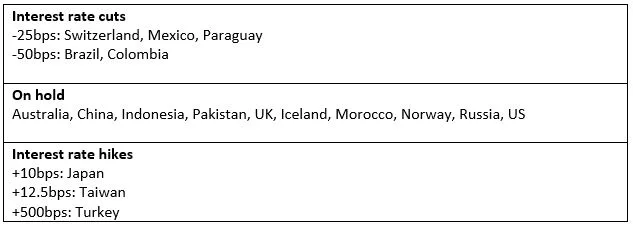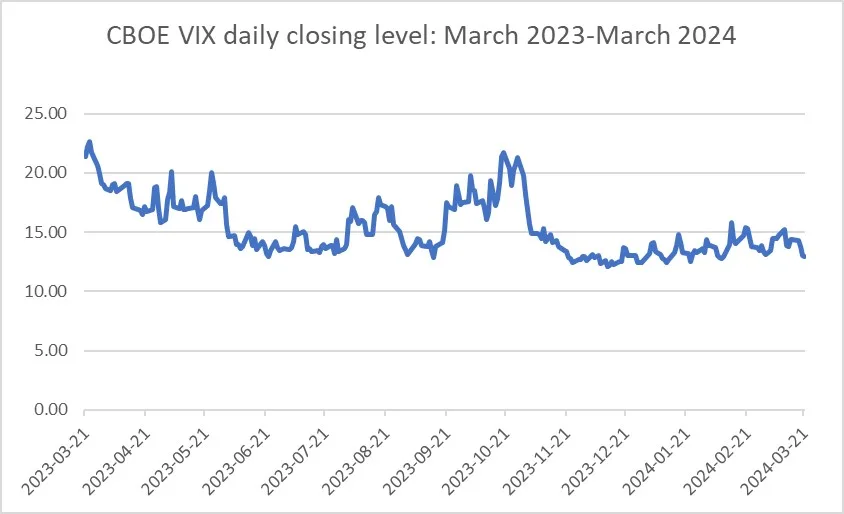In our latest round-up of developments in financial markets and economies, we consider the implications of a major week for monetary policy announcements.
With a raft of announcements from monetary policymakers in the US, Europe and Asia all coming within the space of a few days, investors across the world were fully absorbed by “Super Central Bank Week”, watching for any change in direction or rhetoric.
As we alluded to in our previous comment, the Bank of Japan (BoJ) was always going to be the main event after stronger-than-expected wage data set the stage for an end to negative interest rates and a first hike since 2007.
The BoJ did not disappoint, lifting rates by 0.1% to a range of 0.0% to 0.1%, scrapping its yield curve control policy and ending its purchases of exchange-traded funds and real estate investment trusts. It will, however, continue to purchase Japanese government bonds at a similar rate to recent history. The language from the BoJ was dovish, which emphasised accommodative policy will be maintained for the time being.
In China, after last month’s surprise cut from the People’s Bank of China (PBoC) to the 5-year Loan Prime Rate (LPR), investors were in wait-and-see mode. At its March 20 meeting, the PBoC left both the 1-year and 5-year LPR unchanged, possibly due to a pick-up in industrial activity and strong retail sales data. Industrial production was up 7% year-over-year in the first two months, well ahead of the 5.2% forecasted, driven by strong capital spending. Meanwhile, retail sales were up 5.5% over the same period.
In its recent communications, the PBoC has highlighted the abundance of tools at its disposal to stimulate the economy. Emphasising the point, recent weakening of the yuan shows China’s willingness to improve its terms of trade and stimulate exports.
The region’s one surprising rate decision came from Taiwan’s central bank, which tightened policy rates by 0.125% to 2% and raised its inflation forecast to 2.2% from 1.9%. This suggests the economy will overshoot its 2% target for the third year in a row.
Rate cuts in play for BoE
Turning to Europe, most attention was on the Bank of England (BoE). While the Monetary Policy Committee voted by a majority of 8:1 to keep rates on hold as expected at 5.25%, two of those votes came from the previously hawkish committee members, Jonathan Haskel and Catherine Mann.
In an interview with the Financial Times, BoE governor Andrew Bailey said rate cuts are “in play”1 and it will not be necessary to see inflation fall to the 2% target before cutting begins. Wage inflation risk seems to be receding after February data showed consumer prices falling from 4% to 3.4%, below consensus expectations of 3.5%. The overnight interest-rate swap market is pricing in an 85% chance the BoE will cut rates in June.
Elsewhere, the Swiss National Bank (SNB) surprised, cutting policy rates from 1.75% to 1.5%, with its chairman Thomas Jordon claiming victory in the fight against inflation. Meanwhile, Turkey’s central bank, the CBRT, continued its tough stance to normalise the economy, surprising some investors by hiking the one-week repo rate by 5%. In a Bloomberg survey, 19 of 21 economists expected the repo rate to remain at 45%. Justifying the move, the CBRT said it will look to keep policy restrictive until it sees a sustained decline in inflation.
Fed remains committed to stay loose
The key meeting in the Americas took place in the US. After a string of sticky inflation prints and robust employment data, investors were watching for any sign the Federal Open Market Committee would pull back from its commitment to policy loosening over the summer. The answer was no. The committee delivered a dovish message: rate cuts are coming, even if inflation or growth run stronger than expected.2
The median dot plot continued to signal 75 basis points in total cuts this year, even though projected core PCE inflation increased from 2.4% to 2.6%, with expectations for growth in 2024 lifted from 1.4% to 2.1%.
In emerging markets, the Mexican central bank began its normalisation of monetary policy, cutting rates by 25bps to 11% after being on hold for the last 12 months. The decision was not unanimous, however, with the bank’s deputy governor voting against the cut and the committee still deeming inflation risks as skewed to the upside. Interest rate moves will be data dependent from here, but the path of least resistance points to a 25bps cut each quarter until rates reach a neutral level of around 8%.
Figure 1: ‘Super Central Bank Week’ policy announcements

Winning the inflation war?
As the dust settles on an epic week of central bank meetings, confidence remains high among many in financial markets that the two-year fight against inflation has largely been successful. Furthermore, hitting inflation targets is not now viewed as a precondition for the removal of restrictive policy.
There may be no better indicator of this than the current lack of financial market volatility, with our preferred measure — the CBOE Volatility Index (VIX) — falling 10% from 14.4 to 12.8 (see Chart of The Week). This suggests investors are increasingly confident on the direction of global monetary policy, believing any future moves will be supportive for asset prices.
Chart of the Week: Volatility remains supressed

Source CBOE, as of March 21, 2024. Index performance is for illustrative purposes only. You cannot invest directly in the index.
A note to our regular readers that due to public holidays, the next edition of the Muzinich Weekly Market Comment will be published on April 8, 2024.
References
1. Financial Times, ‘Andrew Bailey says rate cuts ‘in play’ in upbeat take on UK economy’, March 22, 2024
2.Reuters, ‘Fed sees three rate cuts in 2024 but a more shallow easing path’, March 20, 2024
This material is not intended to be relied upon as a forecast, research, or investment advice, and is not a recommendation, offer or solicitation to buy or sell any securities or to adopt any investment strategy. The opinions expressed by Muzinich & Co. are as of 25 March 2024 and may change without notice. All data figures are from Bloomberg as of 25 March 2024, unless otherwise stated. 2024-03-23-13203
Important Information
Muzinich & Co.”, “Muzinich” and/or the “Firm” referenced herein is defined as Muzinich & Co. Inc. and its affiliates. This material has been produced for information purposes only and as such the views contained herein are not to be taken as investment advice. Opinions are as of date of publication and are subject to change without reference or notification to you. Past performance is not a reliable indicator of current or future results and should not be the sole factor of consideration when selecting a product or strategy. The value of investments and the income from them may fall as well as rise and is not guaranteed and investors may not get back the full amount invested. Rates of exchange may cause the value of investments to rise or fall. Emerging Markets may be more risky than more developed markets for a variety of reasons, including but not limited to, increased political, social and economic instability, heightened pricing volatility and reduced market liquidity. Any research in this document has been obtained and may have been acted on by Muzinich for its own purpose. The results of such research are being made available for information purposes and no assurances are made as to their accuracy. Opinions and statements of financial market trends that are based on market conditions constitute our judgment and this judgment may prove to be wrong. The views and opinions expressed should not be construed as an offer to buy or sell or invitation to engage in any investment activity, they are for information purposes only. Any forward-looking information or statements expressed in the above may prove to be incorrect. In light of the significant uncertainties inherent in the forward-looking statements included herein, the inclusion of such information should not be regarded as a representation that the objectives and plans discussed herein will be achieved. Muzinich gives no undertaking that it shall update any of the information, data and opinions contained in the above. United States: This material is for Institutional Investor use only – not for retail distribution. Muzinich & Co., Inc. is a registered investment adviser with the Securities and Exchange Commission (SEC). Muzinich & Co., Inc.’s being a Registered Investment Adviser with the SEC in no way shall imply a certain level of skill or training or any authorization or approval by the SEC. Issued in the European Union by Muzinich & Co. (Ireland) Limited, which is authorized and regulated by the Central Bank of Ireland. Registered in Ireland, Company Registration No. 307511. Registered address: 32 Molesworth Street, Dublin 2, D02 Y512, Ireland. Issued in Switzerland by Muzinich & Co. (Switzerland) AG. Registered in Switzerland No. CHE-389.422.108. Registered address: Tödistrasse 5, 8002 Zurich, Switzerland. Issued in Singapore and Hong Kong by Muzinich & Co. (Singapore) Pte. Limited, which is licensed and regulated by the Monetary Authority of Singapore. Registered in Singapore No. 201624477K. Registered address: 6 Battery Road, #26-05, Singapore, 049909. Issued in all other jurisdictions (excluding the U.S.) by Muzinich & Co. Limited. which is authorized and regulated by the Financial Conduct Authority. Registered in England and Wales No. 3852444. Registered address: 8 Hanover Street, London W1S 1YQ, United Kingdom.

